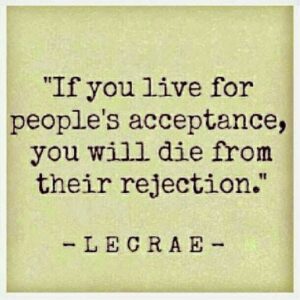《自律養生實踐家之旅379》 被拒絕的平常心

曾有幾位保險從業女性主動來訪,勇敢的推銷自己。由於彼此陌生、缺乏信任基礎,我最終沒有成為她們的客戶。
我沒有明白拒絕,但沒答應其實就是拒絕。坦白說,我十分欣賞她們的勇氣,只是對於這類需要長期服務的專業,我格外謹慎。
其實,被拒絕並非業務員的專利。人生中,我們每個人都要經歷數百次的拒絕:情感上的拒絕、工作上的拒絕、甚至求職被拒絕。
我剛開始透過房仲賣房時,也常接到各式各樣的陌生拜訪。印象最深的一次,是收到一位女性房仲的親筆信,字裡行間誠意滿滿。就在我考慮換房仲的時候,打電話去她的公司,卻得知她已經離職。
很明顯,她是個新手。那封信或許是她用盡勇氣的推廣方式,只是她沒能撐過這個競爭激烈的環境。這讓我想起許多剛入行的業務員,手裡拿著名片、緊張的按著每一戶門鈴。
現實是:若承受不了被拒絕的壓力,這份工作就不適合你。
我在講台上銷售斷食近二十年,課堂上的接受度都不低,但真正能持續執行、將之內化為生活準則的人卻少之又少。
這些年的授課經驗讓我看見兩個明確結論:一是環境的干擾力極大,二是學習力普遍低迷。
我從未懷疑自己推廣的主題,結果的呈現,只是反映了現實的生態。願意透過「身體之道」去看見未來健康成績單的人,永遠是極少數。
若用比喻形容,我像是一位陣亡率最高的部隊長官,也像是一名客戶折損率最高的業務員。
若這是一份領薪的工作,我早該被淘汰。但幸運的是,我不是為了錢而投入這條路,也從不計較報酬。
在這份工作成為使命之前,我早已明白:它的價值遠超過金錢。
當我對這份使命愈加熟練,便發現「不被接受」是一種自然現象,沒有動機的人留不下來,而我也不該強留他們。
這不是酸葡萄心態,而是看懂了人心。願意改變的人,眼神裡會有一種獨特的光;那是身心靈準備合一的光。
而那些尚未準備好的人,我學會微笑目送,慶幸彼此都給了對方機會。
一路走來,從淺淺的領悟到如今的深刻體會,我對「身體」的信任持續累積。
我能理解多數人對此不置可否的反應,因為「不理解」會帶來痛苦,「不信任」也會帶來相同的結果。
不了解身體要什麼,就不會願意與身體合作;不信任身體,就不會把健康的主導權交還給它。
當我意識到情緒本身也有儲存槽,就開始好奇「被拒絕」這種情緒的運作。回顧自己的一生,我忽然發現,真正熟悉「被拒絕」的,其實是我們的身體。
當身體說「我不餓」時,我們卻一再餵食;當身體說「我想休息」時,我們卻堅持加班。
在這些時刻,真正拒絕身體的人,是我們自己。
許多人因「被拒絕」而生病,他們把被拒絕轉成憤怒,把被拒絕轉成悲傷,把拒絕的經驗轉化為內在的情緒毒素。
他們說:「人生好苦,求救被拒絕、求愛被拒絕、求助被拒絕。」渴望得到回應,卻總是事與願違。
這樣的劇本,往往在病榻上被重播。疾病有因,逆境亦然。當我們沒有在第一時間承擔該承擔的,就得面對被拒絕的後果。
生病的人往往無法反思自身的處境,醫生不會拒絕醫治你,但你的身體早已拒絕再為你承擔。
我們拒絕了自己的身體,於是身體也拒絕了我們,這才是「被拒絕」最寫實的劇本。
所有的病痛,都源自於自己與自身的不相容,還有與身體的不相容。
當癌症研究一層層剝開病因,最終理出「被拒絕」的因子,我相信科學家也未必能馬上想到:那其實源自我們與身體之間的相互拒絕。
拒絕自己的人,終將被他人拒絕。
我之所以寫下這篇文章,是想提醒那些想分享斷食經驗的人:除了不主動推銷,更要懂得節制言語。
對於有興趣的親友,記得口徑一致:「你不一定做得來。」
因為「三緘其口」是斷食最好的行銷,真正的推廣,不在言語,而在氣色與身心狀態的改變。
如此一來,就不會有被拒絕的困擾。即使對方真的說:「我做不來」,也能以平常心回應。
被拒絕的平常心,是一種修煉。能不拒絕斷食、也不拒絕自己的,從來都不是凡人。
(如果你為了他人的認可而活,你也會因他們的否定而死。)
The Calmness of Being Rejected
A few women working in insurance once visited me, courageously promoting themselves and their services. Since we were strangers and lacked a foundation of trust, I did not become their client.
I never said “no” directly—but not saying “yes” was already a form of refusal.
To be honest, I admired their courage. Yet when it comes to professions that require long-term service and commitment, I tend to be extra cautious.
In truth, being rejected is not the exclusive experience of salespeople. In life, each of us encounters hundreds of rejections—emotional, professional, or even during job applications.
When I first sold my house through a real estate agent, I often received all kinds of unsolicited visits. One encounter left a deep impression on me: I once received a handwritten letter from a young female agent, filled with sincerity in every word.
Later, when I was considering changing agents, I called her company—only to learn that she had already resigned.
It was obvious she was a beginner. That letter might have been her boldest effort, but she didn’t survive in that fiercely competitive world.
It reminded me of those newly minted salespeople clutching business cards, nervously ringing doorbells one after another.
The reality is simple: if you cannot endure rejection, this job is not for you.
—
I’ve been teaching and promoting fasting for nearly twenty years. The acceptance rate in my classes is quite high, yet the number of people who truly persist—and internalize it as a way of living—is very small.
Through these years of experience, I’ve drawn two clear conclusions: first, the environment has enormous influence; second, people’s capacity for learning is generally low.
I have never doubted the value of what I teach. The outcomes I see merely reflect the state of the world.
Those who are willing to look at their future health through the Way of the Body will always be a rare minority.
If I were to use a metaphor, I am like a commander of a unit with the highest casualty rate, or a salesperson with the highest client attrition.
If this were a salaried job, I would have been eliminated long ago.
Fortunately, I am not on this path for money, nor do I measure its worth in financial terms.
Before this work became my mission, I already understood that its value far exceeded money.
And as I grew more seasoned in this mission, I realized that not being accepted is a natural phenomenon.
Those without true motivation will not stay—and I should not try to keep them.
This is not bitterness; it is clarity.
People who are ready to change carry a certain light in their eyes—the light of alignment between body, mind, and spirit.
For those who are not yet ready, I have learned to smile and let them go—grateful that we met at all.
—
From early realizations to deeper insight, my trust in the body has grown stronger with time.
I understand why most people respond with skepticism—because not understanding brings pain, and not trusting leads to the same result.
When one does not understand what the body truly wants, one cannot cooperate with it;
when one does not trust the body, one cannot return to it the authority over health.
When I realized that even emotions have their own storage tank, I began to wonder how the emotion of being rejected functions.
Looking back at my life, I suddenly understood: the one most familiar with rejection is actually the body.
When the body says, “I’m not hungry,” we feed it anyway.
When the body says, “I need rest,” we insist on working overtime.
In these moments, the one rejecting the body—is ourselves.
—
Many people fall ill because of rejection.
They turn rejection into anger, rejection into sorrow, rejection into a reservoir of emotional toxins.
They say, “Life is so bitter—my cry for help was rejected, my love was rejected, my efforts were rejected.”
They crave a response, yet the world remains silent.
This script is often replayed on the sickbed.
Illness has its causes, just as adversity has its roots.
When we fail to face what must be faced at the first moment, we eventually confront the consequence of rejection.
The sick rarely reflect on their situation.
Doctors will not refuse to treat you—but your body may already have refused to carry you further.
We reject our own bodies, and in return, the body rejects us.
This is the most honest script of rejection.
All illnesses stem from a lack of compatibility—between you and yourself, between you and your body.
If cancer research were to peel away layer after layer of causes, eventually identifying a “rejection factor,” I believe even scientists might not realize: it originates from the mutual rejection between us and our bodies.
Those who reject themselves will inevitably be rejected by others.
—
The reason I wrote this essay is to remind those who wish to share their fasting experiences:
Do not promote it too eagerly, and learn to restrain your words.
When talking to curious friends or relatives, always keep your tone consistent:
> “You might not be ready for this.”
Silence is the best marketing for fasting.
True promotion is not through words, but through the glow of one’s face and the harmony of one’s body and mind.
That way, rejection will no longer trouble you.
Even if someone says, “I can’t do it,” you can respond with calm acceptance.
The calmness of being rejected is a form of practice.
To neither reject fasting nor reject oneself—that has never been an ordinary person’s path.


